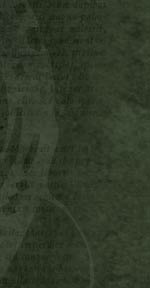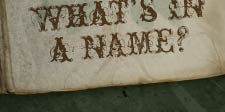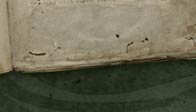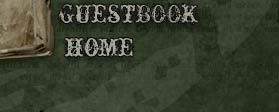- Confirmed by JK Rowling
- Very confident in its accuracy
- Moderately confident in its accuracy
- Not very confident
- Confirmed false, but I felt like posting it anyway.
Salamander - a fire-dwelling lizard creature
- From folklore. A mythical creature, generally resembling a lizard, believed capable of living in or withstanding fire.
Scamander, Newton Artemis Fido - author of "Fantastic Beasts and Where to Find Them"
- As Harry so aptly says in the margin, "nice name". "Newt" is a type of salamander. "Artemis" is the Greek goddess of beasts and the hunt. "Fido" is a rather boring name for a dog. "Scamander" is the ancient name for a river in Troy.
Scourgify - cleaning charm
- From "scour", to vigorously remove grime and dirt.
Scrivenshaft's - a quill shop in Hogsmeade
- "Scri-" pertains to writing. "Shaft" most likely references the shaft of the quill.
Scurvy-grass - plant Harry studies in Herbology
- Scurvy grass is a cruciferous herb (as Cochlearia officinalis) formerly believed useful in preventing or treating scurvy.
Sea Serpent - exactly what it sounds like
- Straight from folklore.
Serpensortia - Spell used by Malfoy in Dueling Club in which a huge snake burst from the end of his wand.
- Serpens ["snake", Latin] + sortir ["to leave", French].
- Serpens ["snake", Latin] + ortus ["to create", Latin]. --Greg Siverling
Severus Snape - See "Snape, Severus"
Shield Charm - used to deflect curses
- "Protego," the spellword, comes from the Latin protegere, "to protect."
Shunpike, Stan - conductor of the Knight Bus
- A "shunpike" is a side road used to avoid the toll on or the speed and traffic of a superhighway. (Thanks to Steve Vander Ark)
Sibyl Patricia Trelawney - See "Trelawney, Sibyl"
Sickle - silver coins, 17 sickles to a galleon. 29 knuts to a sickle. (Picture - thanks to HP Galleries)
- A tool made up of a curved blade attached to a short handle, used for cutting grain or tall grass.
- Haruka points out that it could be the equivalent of "nickel". Of course, they don't have nickels in the UK...
Sinistra, Professor - Astronomy professor
- Derives from Latin sinister, meaning left. Wikipedia suggests that "the most probable explanation for this is that the planets of the solar system rotate anticlockwise (from right to left)."
- Sinistra is a star in the constellation Ophiuchus (known as the "serpent holder").
Sir Nicholas de Mimsy-Porpington - See "Nearly-Headless Nick"
Sirius Black - See "Black, Sirius"
Skeeter, Rita - tabloid reporter for Witch Weekly and The Daily Prophet. Unregistered beetle animagus.
- Her title, Miss Skeeter, sounds an awful lot like "mosquito", which also happen to be bloodsucking little insect pests that go out of their way to make us suffer.
Slytherin, Salazar - creator of the "pureblood" mentality; one of four Hogwarts founders
- Antonio Salazar was the fascist dictator of Portugal for 36 years until his death in 1968. Though never officially an ethnic cleanser, he was a colonialist, who ruthlessly put down ethnic uprisings his his country's colonies in Africa. His name is perhaps used as a reference to the dictators past, such as Hitler, who believed in ethnic purity, just as Slytherin did. (Taken directly from Encyclopedia Potterica)
- "Slytherin" is basically "slithering" minus the "g", and the snake is the symbol for Slytherin house. He himself is nicknamed "Serpent-Tongue" after his parselmouth abilities. "Slytherin" could also be a breakdown of "sly therein", meaning "clever in that circumstance" (thanks to Indigo)
Smeltings - Boarding school attended by Dudley. Uncle Vernon's Alma Matter
- Milz of HP4GU points out that, "smelting" is the act of refining metal ore. If so, then maybe "Smeltings" is a place where one is supposed to be "refined", as in a finishing school? Amanda (also on HP4GU) adds that a smelt (noun) is "any of certain small food fishes which closely resemble the trout in general structure. To smelt (verb) is to melt or fuse, as ore, usually to separate the metal. And it's the past and past participle of "to smell," at least in Britain where their strong verbs are not fading so rapidly as in American English. So I [Amanda] suspect that with the fish and smelly connotations, JKR picked it because having such a ridiculous word being treated with such reverence by the Dursleys is funny.
Smethwyck, Hippocrates - Healer-in-charge of the Dai Llewellyn Ward at St. Mungo's
- Hipporates is known as the Father of Medicine. He was a Greek physician, traditionally but incorrectly credited with Hippocratic oath administered to graduate physicians.
- Smethwick is a city in Staffordshire in central England, near Birmingham.
Snape, Severus - Potions teacher and head of Slytherin house. Rival of James, Remus, Sirius, and Peter.
- "Severus" is Latin for "stern" or "harsh". There was a Roman emperor named Lucius Severus. Supposedly, Jo made the Potions master the "enemy" because she didn't like a Chemistry teacher she once had.
- "Snape" is a small town Jo once visited.
- According to Blaise and the OED: I was delighted to find that the word "snape" actually has a meaning beyond simply being a place-name (in that context it means a boggy patch of ground). To snape someone means to rebuke or hurt them, and a snape is a rebuke. It's an almost obsolete English dialectical word from the Norse, if anyone cares.
Snidget - preceeding the Golden Snitch
- "Snidget" and "Snitch" aren't that far off. Although in the Wizarding world, the word "snitch" is derived from "snidget", I imagine Jo came up with the terms the other way around.
Sonorus - Spell used to magnify one's voice
- "Sono" is Latin for "to make a sound".
Spellotape - wizards' tape used to mend broken items
- A spoof on "Sellotape", the British equivalent of scotch tape.
Sphinx - half-human, half-lion. Enjoys riddles.
- In ancient Egypt, the Sphinx is a male statue of a lion with the head of a human, sometimes with wings. Most sphinxes however represent a king in his appearance as the sun god. The name "sphinx" was applied to the portraits of kings by the Greeks who visited Egypt in later centuries, because of the similarity of these statues to their Sphinx. The Greek Sphinx was a demon of death and destruction and bad luck. It was a female creature, sometimes depicted as a winged lion with a feminine head, and sometimes as a female with the chest, paws and claws of a lion, a snake tail and bird wings.
Spore, Phyllida - author of One Thousand Magical Herbs and Fungi.
- "Phyll" refers to plants.
- A spore is a one-celled reproductive body or resting stage, as of a fern, fungus, or bacterium.
Sprout, Professor Pomona - Herbology teacher at Hogwarts.
- Sprout: a young plant growth, such as a bud or shoot.
- Pomona: Goddess of fruit trees in Roman Mythology.
Squib - A person born to wizard parents, but has no wizarding talent.
- A "Squib" is a small firecracker that doesn't explode. It's also term used in cinematography for a device that makes it appear as if someone has been shot.
Stinksap - a vile secretion spewed by the Mimbulus mimbletonia plant.
- Straightforward enough. No explanation needed.
Stupefy - stunning spell
- "Stupere" is Latin for "to be stunned". "Stupefy" in English means "to dull the senses of; daze".
Sugar Quills - sold in Honeydukes
- When asked if she borrowed this sweet from Roald Dahl's Charlie and the Chocolate Factory, she responded, "Oh dear, I don't know whether I did or not. Not consciously, anyway. But it's not a very difficult idea to come up with; we all suck the ends of pens and pencils (or I do), so it seemed logical to make them taste nice, and at Hogwarts, obviously, they use quills!"
Surrey - Home of the Dursleys
- A county in the southeast of England, adjoining the county of Greater London. The city of Little Whinging is fictional, though.
Switch, Emeric - author of "A Beginner's Guide to Transfiguration"
- A switch is a change or shift from one thing to another.
| Previous Letter | Names Index | Next Letter |











